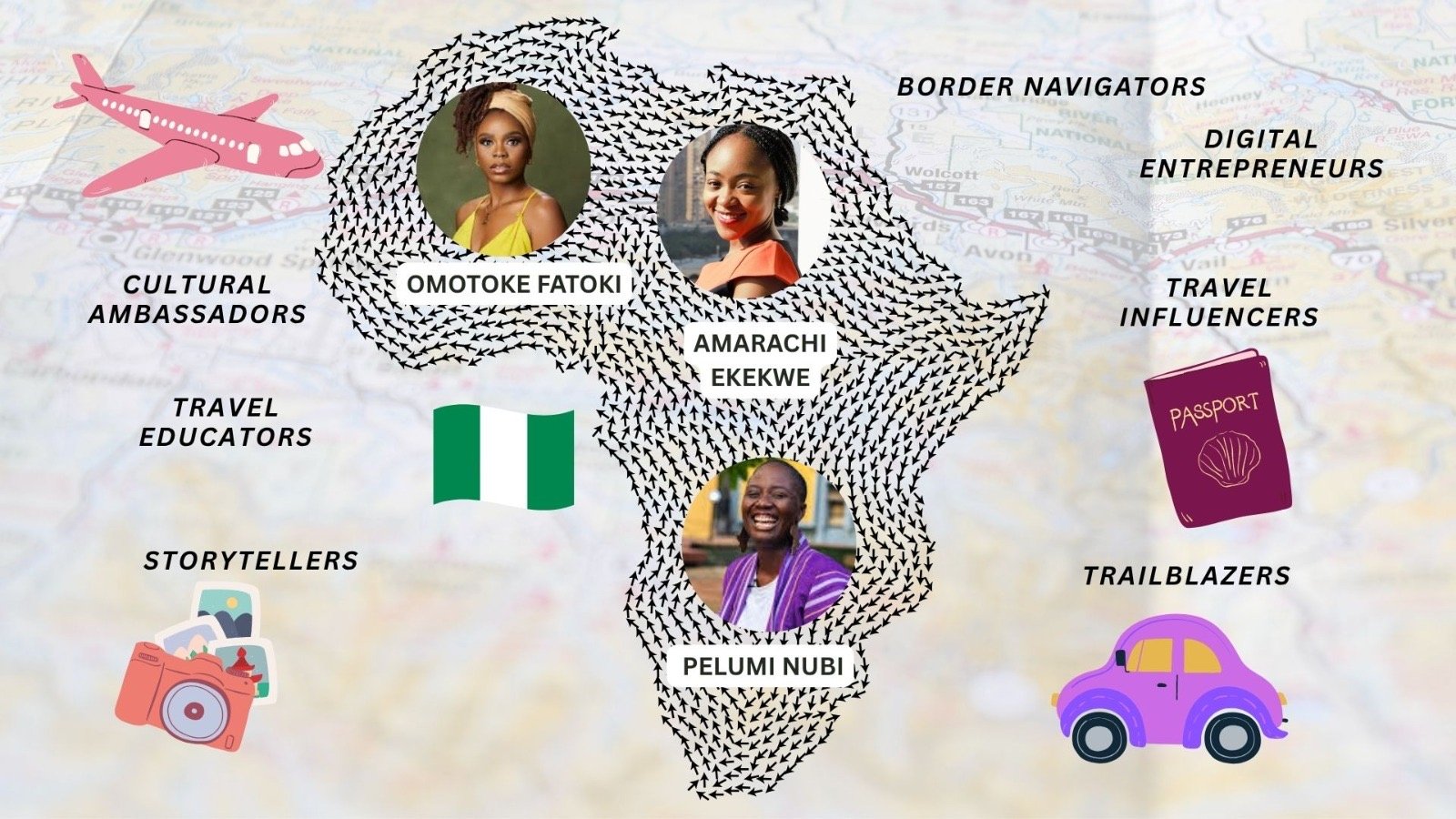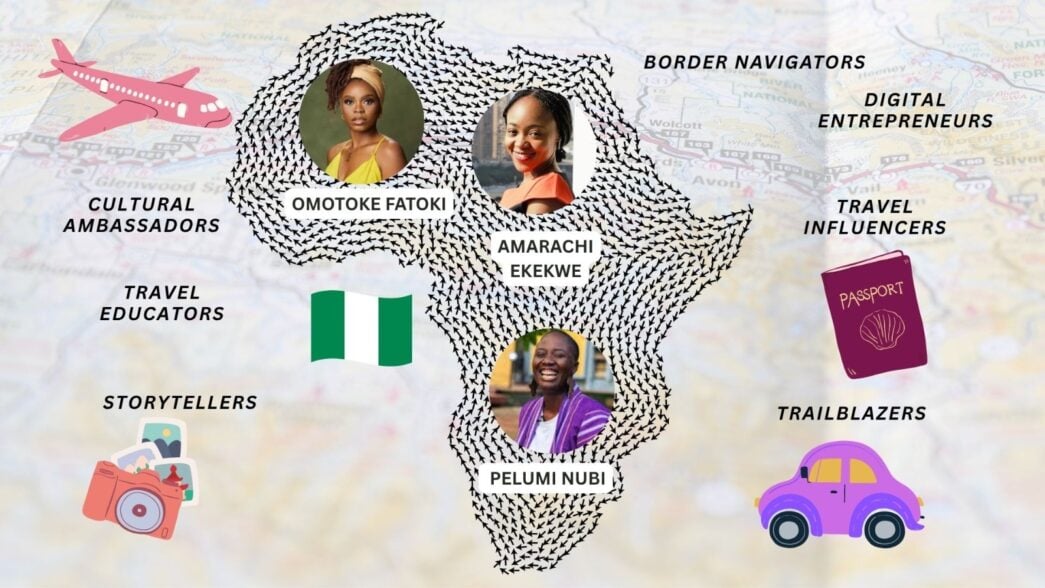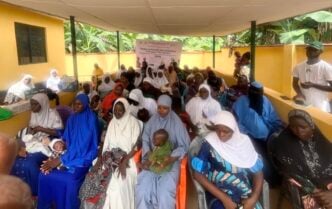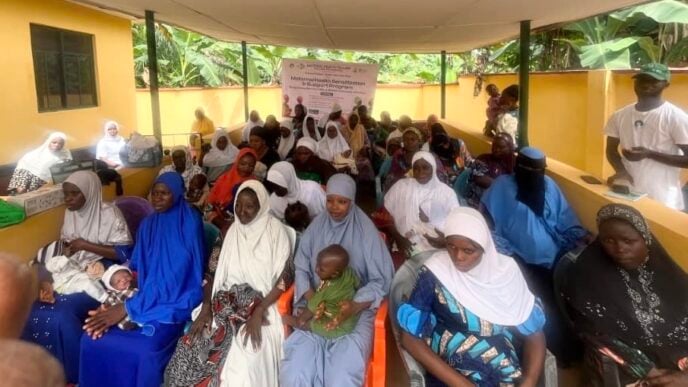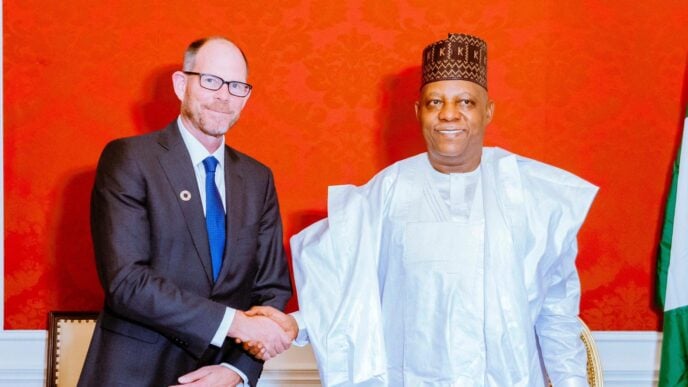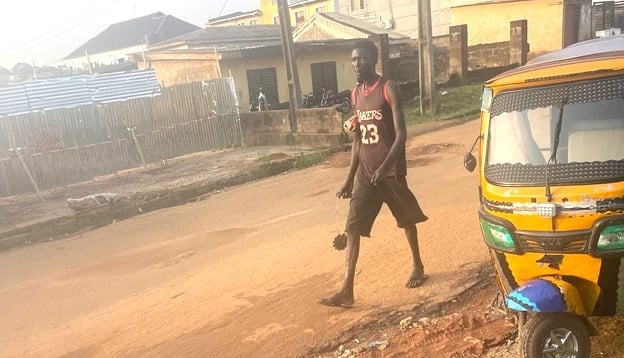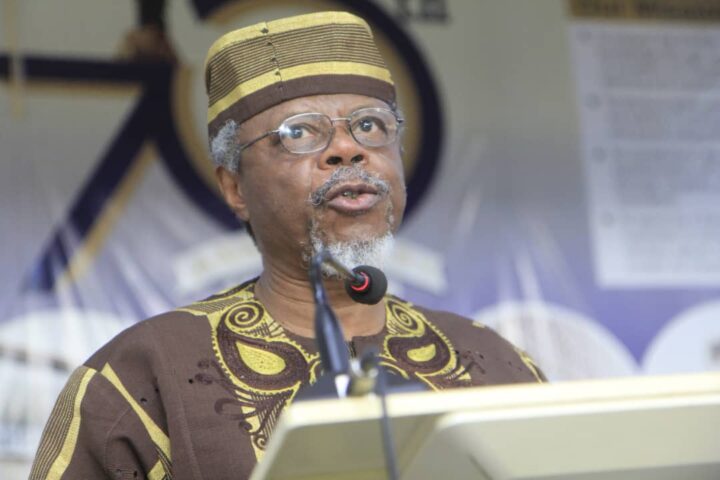BY MABEL ECHEWUNE
From Omotoke Fatoki backpacking across Africa by road, to Amarachi Ekekwe blending travel with her 9-to-5 job, and to Pelumi Nubi’s solo drive across West Africa, this is the story of three Nigerian women remapping what it means to migrate, move, and create across the African continent.
These women are not just travellers. They are cultural ambassadors, digital entrepreneurs, and storytellers navigating and challenging the deeply flawed mobility systems of modern Africa.
As a Nigerian photojournalist and 2025 Baraza Fellow, I spent months exploring how travel content creators, especially Nigerian women, navigate the continent’s complex mobility systems. What emerged is a tale of bold journeys, structural roadblocks, and the quiet revolution taking place one border at a time.
Advertisement
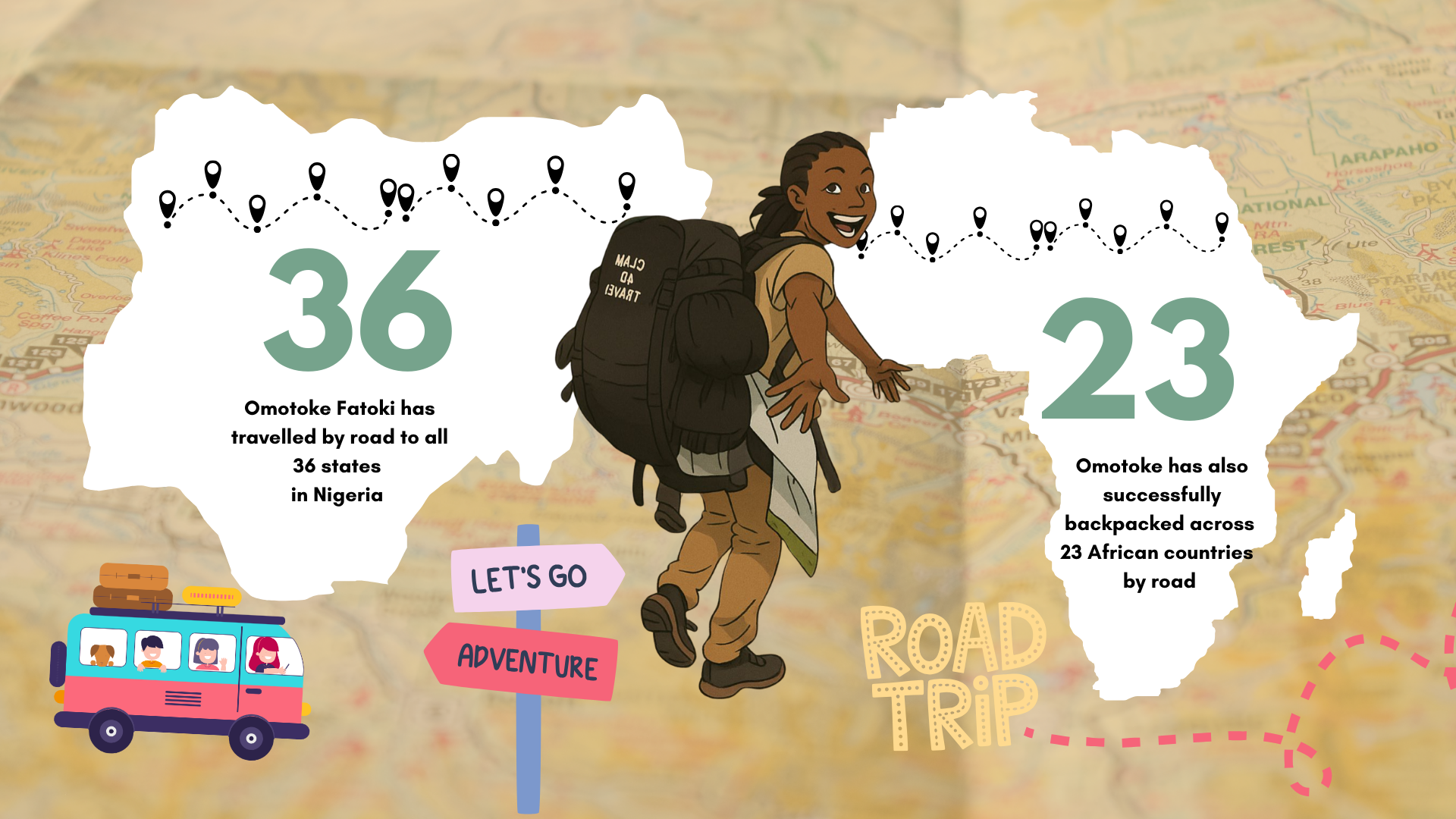
Omotoke Fatoki has travelled by road to all 36 states in Nigeria and is currently backpacking across Africa by road, having successfully covered 23 of the African countries.
“I wasn’t doing much as a fresh graduate,” she recalled. “So I walked. Then I never stopped.”
Advertisement
Her love for travelling grew steadily, and what started as a means of escape has now become a lifestyle. Her curiosity about other people’s cultures and ways of living inspired her focus on intra-African travel. The more she travels, the more she realises the continent is misrepresented. Omotoke believes we must consistently experience it ourselves to tell a better story and discover Africa as individuals and nations. She sees her purpose as inspiring more people to explore the continent, one content at a time.
Omotoke’s Nigerian passport has significantly impacted her ability to travel within Africa. “I have had to turn back home because I can’t afford the visa as a Nigerian traveller,” she said.
“I shouldn’t need 46 visas to travel within Africa. If I need a visa at all, there should be a guarantee that I get it as a citizen of this continent. I had to halt my next trip because I have to go through months of a rigorous visa application process and work twice as hard to have a bank statement that proves I can afford to travel to these countries.”
Despite these challenges, she has never been denied a visa or entry within an African country and has only considered migration within Africa.
Advertisement
“Honestly, I’m an African girl, and this is my home. Travelling across the continent makes me feel more grounded and aware. It has made me appreciate the gift of travelling more,” she said.
Omotoke allows her travel experiences to influence her content creation by sharing her experiences from an unfiltered yet sensitive perspective. This has shaped her storytelling and ensured that her content is portrayed in a positive light. The feedback she receives from African audiences is mostly positive. Many share how they experience destinations through her and express excitement about exploring these places themselves. She hopes for a mentality shift among the few who believe intra-African travel is not worth it.
She is aware of African Union policies such as the AU Passport and the Free Movement Protocol, which have supported her in a few countries. Still, she acknowledges the limitations in access and implementation.
Among the most rewarding aspects of her journey is the human connection. Across every country, she has encountered care, protection, and love that transcend borders. By positively highlighting and sharing unfiltered travel experiences across the continent, she uses her platform to promote African unity and cultural pride.
Advertisement
Her advice to other African travel creators is to start now, be open-minded, and explore more than just the beautiful attractions by deeply and intensely enjoying everything the continent has to offer.
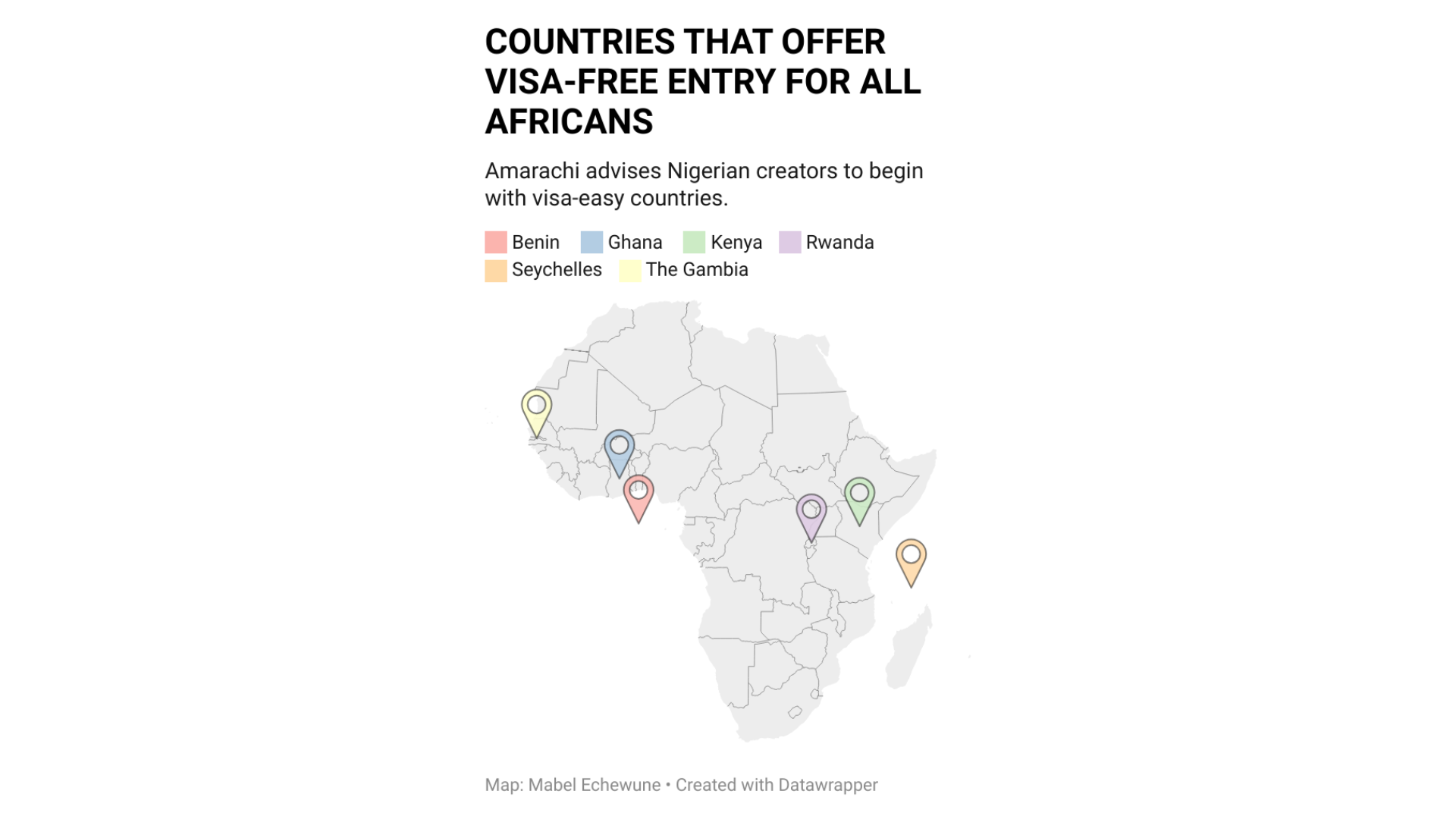
Advertisement
Amarachi Ekekwe H is a systems engineer who travels alongside her 9-5 job and is most often seen on a hiking trail. She began writing articles on her blog after her first international trip, inspired by travel blogs that showed how to explore on a budget. Wanting to share similar tips with a Nigerian audience, she took a ₦15,000 ($40 in 2016) cross-country trip from Nigeria to Togo to demonstrate how to begin the travel journey with limited resources.
While she lives and travels within Africa and frequently writes about these experiences, Amarachi explains that intra-African travel is not the main focus of her content because of the limitations of the Nigerian passport. Many visas are difficult to obtain, and travelling within the continent comes with challenges.
Advertisement
“I’ve faced intense scrutiny at immigration and dealt with long, complicated visa processes. I was once denied a work visa to Angola. I like to think it was an error, especially since it was later rectified for my colleagues, but by then the opportunity had passed,” she said.
When asked if she would consider migrating or obtaining another passport to ease travel, Amarachi said yes. She would love to have the option to travel spontaneously, without dealing with lengthy and expensive visa procedures.
Advertisement
Amarachi’s storytelling is authentic because her recommendations are drawn from lived experience, not just research. This firsthand knowledge helps her share valuable details and cultural nuances that might otherwise be missed. Her African audience often expresses how refreshing it is to see African travel stories told by a fellow African, beyond stereotypes.
On awareness of African Union policies, Amarachi stated, “I’m vaguely aware of the AU Passport and Free Movement Protocol, but they haven’t impacted my travels yet. I’m still restricted by visa requirements for most African countries, which creates barriers for spontaneous content creation. However, I’m grateful for countries like Rwanda that offer visa-free access for AU member states, making it much easier to visit and explore.”
Open borders for African travellers and more affordable transportation options are the policy changes Amarachi recommends to support content creators like her.
The most rewarding experience she had while travelling across Africa was getting stuck in the snow on a closed road between Midelt and Fes in Morocco, when locals invited her and her fellow travellers to sit by their fire in a building. “We couldn’t understand a word they were saying, and they couldn’t understand us, but we spent an hour communicating through gestures and shared laughter. Their genuine hospitality reminded me why I love travelling,” she noted.
Amarachi is the lead content creator for www.travelwithapen.com, a platform that shows Nigerian travel enthusiasts how rewarding travel can be, both locally and internationally. She uses it to share budget-friendly tips and promote African unity through positive storytelling that breaks negative stereotypes.
“I believe an intra-African movement can help strengthen regional economies, build networks, and help us realise that we don’t always need to look outside Africa for better opportunities,” she said.
Her advice to other Nigerian creators is to start with visa-easy countries like Rwanda, Ghana, or Seychelles, research visa requirements early, connect with local creators, and approach destinations with genuine curiosity, not just content goals.
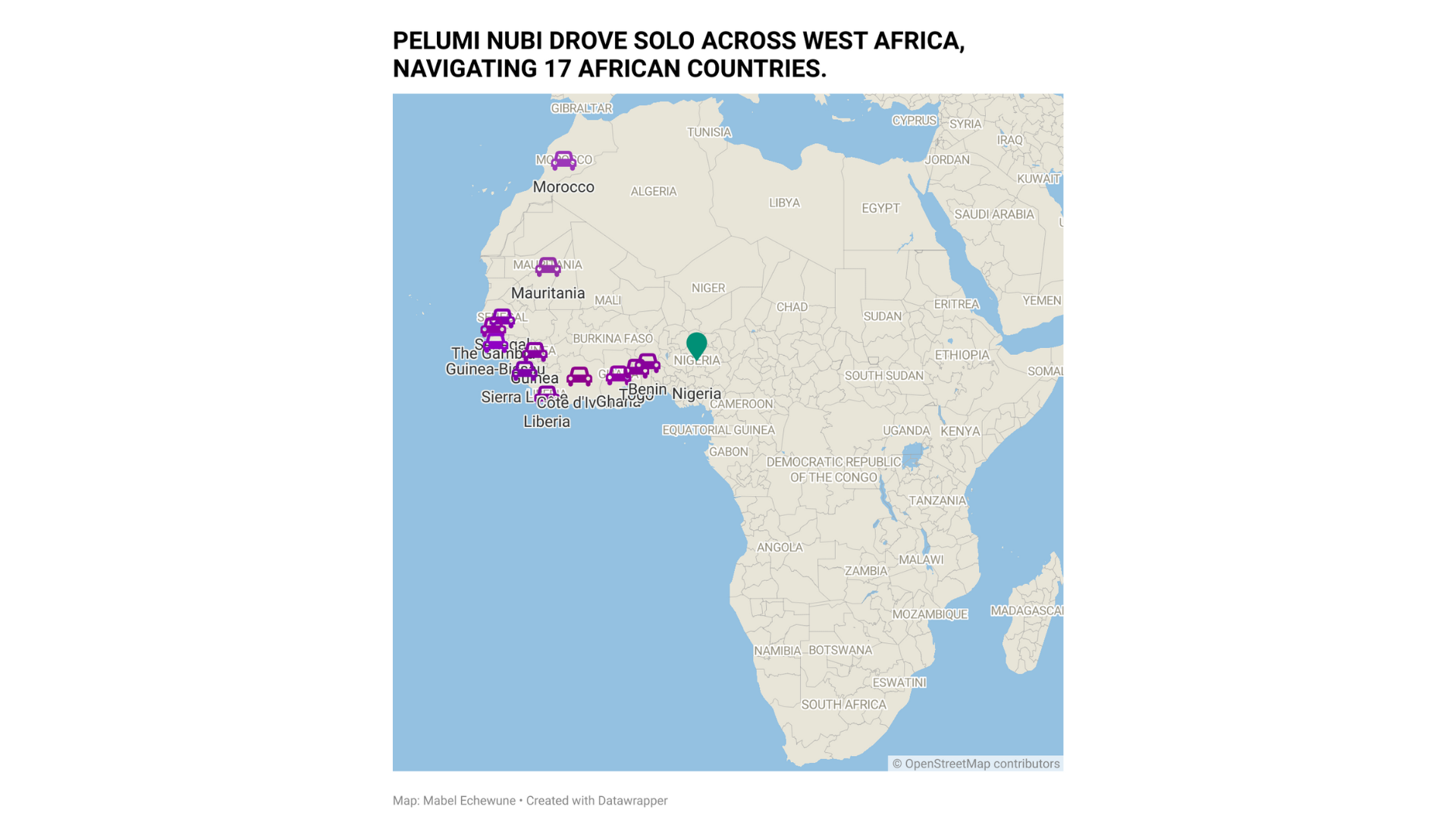
Pelumi Nubi drove solo across West Africa, navigating 17 African countries. Her journey revealed both the cracks in Africa’s mobility systems and the deep ties that bind its communities. It was not an escape, but an act of return, exploration, and reclamation.
Pelumi began her travel content journey in 2017, initially as a way to document her trips. It quickly evolved into a passion for storytelling. She discovered the power of travel content to inspire others to step out of their comfort zones and explore new cultures.
Her focus on intra-African travel stemmed from curiosity and frustration. Much of the content about Africa she encountered growing up was limited or negative. “I realised how connected yet disconnected we are as Africans,” she said. “Crossing borders wasn’t always easy, and there were misconceptions even among us.” Her mission became to change that narrative and encourage Africans to explore the continent.
Travelling on a Nigerian passport shaped her journey in complex ways. “Even within Africa, visa requirements can be strict and unpredictable. Some borders that should be easy to cross as an ECOWAS citizen still require lengthy questioning, extra fees, or refusals,” she shared. These experiences fuel her advocacy for better regional integration.
Although she holds dual citizenship, Pelumi emphasises her Nigerian identity when travelling: “If I only travelled on my other passport and stayed silent about the differences in treatment, I’d be ignoring a very real inequality.”
Pelumi’s travel experiences are central to her storytelling. “It’s about the people I meet, the small moments of connection, and the frustrations like crossing borders. I want people to see the highs and lows, and the reality of travelling as an African woman,” Pelumi noted.
The feedback from African audiences has been overwhelmingly positive. She said, “I’ve had Nigerians tell me, ‘I didn’t know we could drive to Ghana’ or ‘Sierra Leone is beautiful.’” Africans abroad say her content reconnects them to home.
She remains hopeful about the African Union’s Free Movement Protocol, even as practical visa hurdles persist. “Until the policy transitions from words to action, daily life remains unchanged for most African travellers.”
Her most rewarding experience was seeing how interconnected Africa truly is. “Time and again, strangers helped me from border crossings to car breakdowns. That spirit of unity inspires everything I do,” she noted. Through videos, photos, and talks, she amplifies overlooked voices and encourages Africans to explore their continent. She added, “Our stories deserve to be told and celebrated by us.”
Pelumi believes intra-African migration is a solution. “It fosters skills exchange, regional understanding, and unity. People should migrate by choice, not desperation,” she said.
In March 2024, Ghana joined Benin, the Gambia, Rwanda, and Seychelles in offering visa-free entry to all African passport holders. For many, it marked a hopeful milestone, a tangible step toward a borderless Africa and a signal that a new era of intra-African mobility is emerging. But behind the celebration lies a deeper question: is this truly the breakthrough for African integration, or just another slow turn in a long journey?
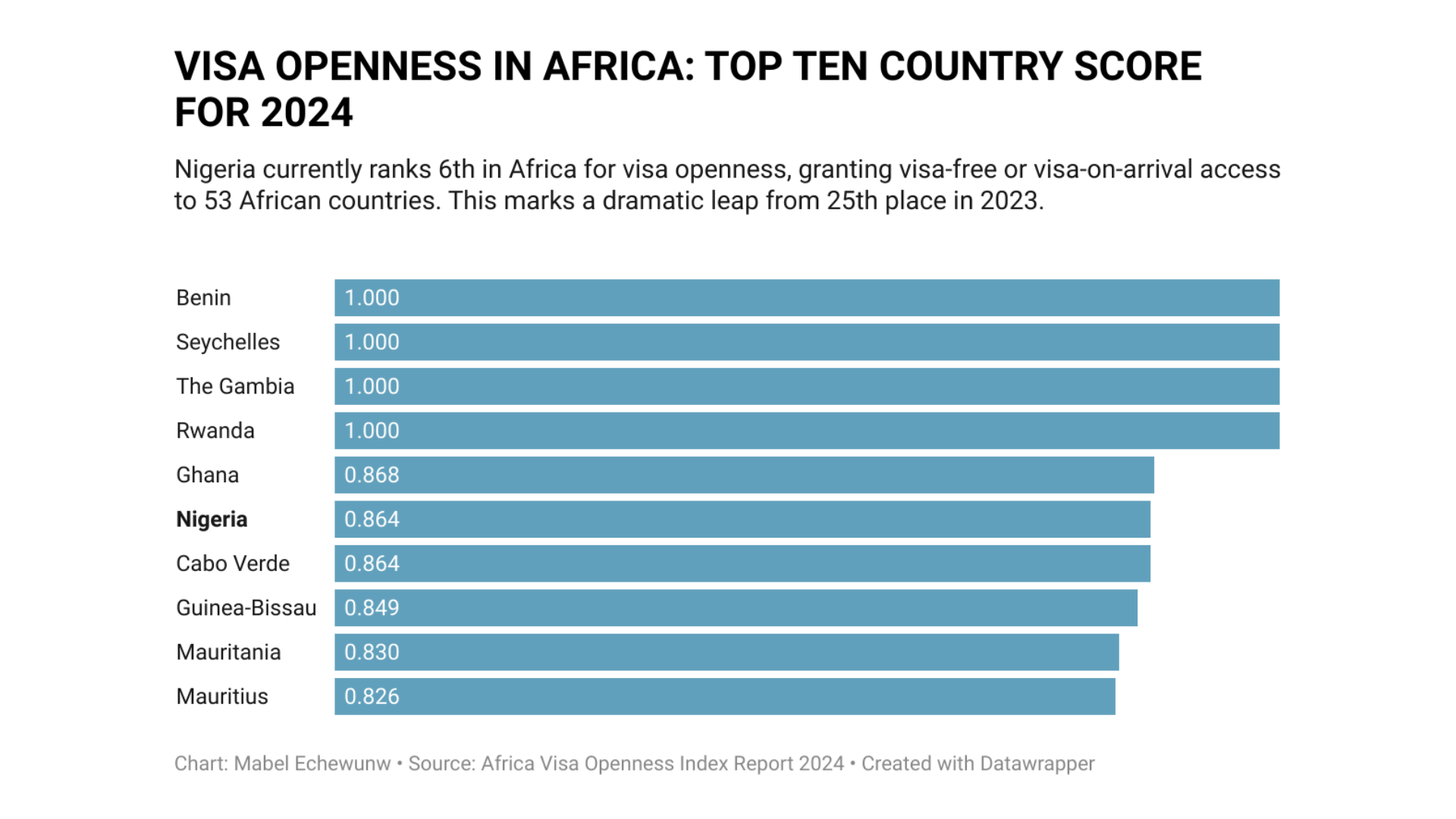
According to the Africa Visa Openness Index Report 2024, Nigeria currently ranks 6th in Africa for visa openness, granting visa-free or visa-on-arrival access to 53 African countries. This marks a dramatic leap from 25th place in 2023, a 19-position improvement, making Nigeria one of the fastest climbers in the index’s history.
Iorsue Paul Aondona serves as an aide for policy and research at the ministry of foreign affairs in Nigeria. In this role, he provides policy guidance and research support on issues related to continental integration, migration, and mobility frameworks. Aondona regards Nigeria’s significant improvement in Africa’s visa openness rankings, rising from 25th to 6th, as both a strategic move and a bold statement of intent to take a lead role in promoting intra-African mobility.
He believes this shift reflects deliberate efforts to dismantle travel barriers, with Nigeria’s size and economic influence enhancing its impact across the continent. By offering visa-free or visa-on-arrival access to 53 African countries, Nigeria is not only enhancing trade, tourism, and professional exchanges under the African Continental Free Trade Area (AfCFTA), but it is also strengthening the Economic Community of West African States (ECOWAS) framework for free movement, potentially inspiring other regional blocs to follow suit.
However, Aondona warns that the work is not yet complete. Countries such as Benin and Gambia already grant visa-free entry to all African nationals. For Nigeria to solidify its leadership position, it must adopt even more liberal policies and fully align itself with the African Union’s agenda for free movement.
The African Union’s Agenda 2063 envisions a connected, prosperous, and competitive Africa. Central to this dream is free movement, the ability of Africans to travel, work, and collaborate across borders. Three key frameworks drive this agenda: the AU Free Movement of Persons Protocol adopted in 2018, the AU Passport designed to replace national passports for seamless travel, and the Single African Air Transport Market (SAATM), launched under the 1999 Yamoussoukro Decision to liberalise airspace, reduce flight costs, and improve connectivity.
However, implementation has been slow. As of 2025, only five countries, Rwanda, Mali, Niger, São Tomé and Príncipe, and Kenya, have accepted the Free Movement Protocol, far from the 15-country minimum required. According to the Africa Visa Openness Index Report 2024 and AU migration updates, the AU passport remains mostly restricted to diplomats. SAATM, though adopted by 34 countries, suffers from poor rollout and non-compliance with air liberalisation terms.
Despite these setbacks, momentum continues, often led by individuals navigating borders. For creators like Pelumi Nubi, travelling in Africa is both a professional duty and a personal mission. Her goal is to document Africa beyond conflict and charity tropes. “Even within Africa, visa requirements can be strict and unpredictable,” she said. “Some borders that should be easy to cross as an ECOWAS citizen still involve lengthy questioning, extra fees, or random refusals.”
While challenges remain, several nations and regional blocs are improving mobility. Nigeria’s improved ranking in the 2024 Africa Visa Openness Index is notable. According to Dr Aondona, the shift reflects Nigeria’s deliberate effort to lead continental integration.
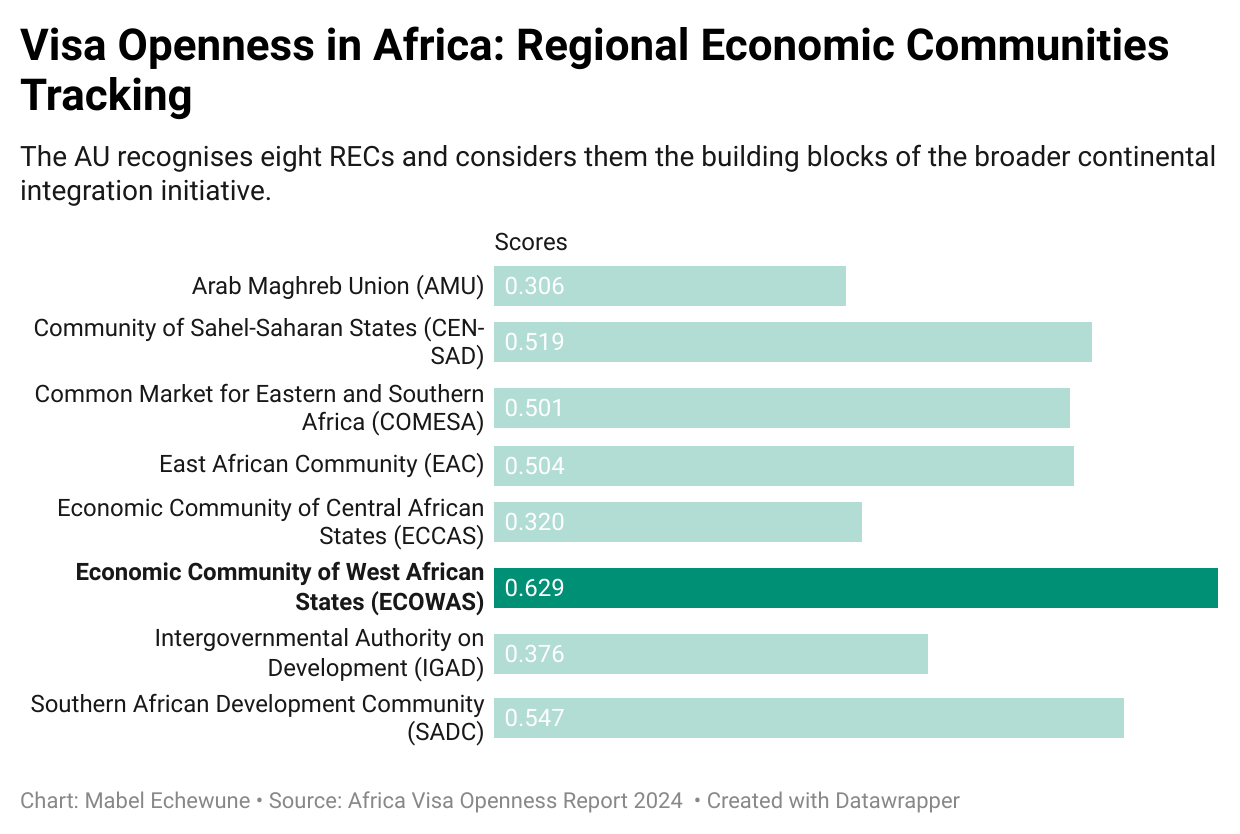
Regional disparities, however, remain stark. West Africa under ECOWAS is the most integrated, with all 15 member states offering 90-day visa-free entry to citizens. Southern Africa’s SADC bloc allows about 80 per cent of citizens to travel visa-free or with visas on arrival, though residence and work permits are often still needed. North Africa’s Arab Maghreb Union lags, with only Tunisia granting full visa-free access to fellow members. East Africa offers a promising model. Kenya, Uganda, and Rwanda have eased border crossings through mutual visa waivers and the use of national ID cards, encouraging smoother movement.
According to Albert Siaw-Boateng, director of free movement of persons and migration at ECOWAS, in his 2025 interview with The Guardian, some regional economic communities, such as ECOWAS and the East African Community, have made significant progress in implementing visa-free policies. While only five countries currently offer visa-free access to all African nationals, regional mobility frameworks are shifting the tide. In Southern Africa, 80 per cent of SADC citizens can travel within the region without a visa or can obtain one on arrival.
These subregional arrangements prove that while continent-wide integration is still developing, practical steps are enabling African connections. Stories from creators like Omotoke Fatoki, Amarachi Ekekwe H, and Pelumi Nubi show that African travellers are already charting the path forward. Their journeys reflect what the data increasingly confirms. When countries cooperate, mobility becomes possible, stories travel farther, and Africa’s dream of unity gains ground not through speeches, but through shared movement.
